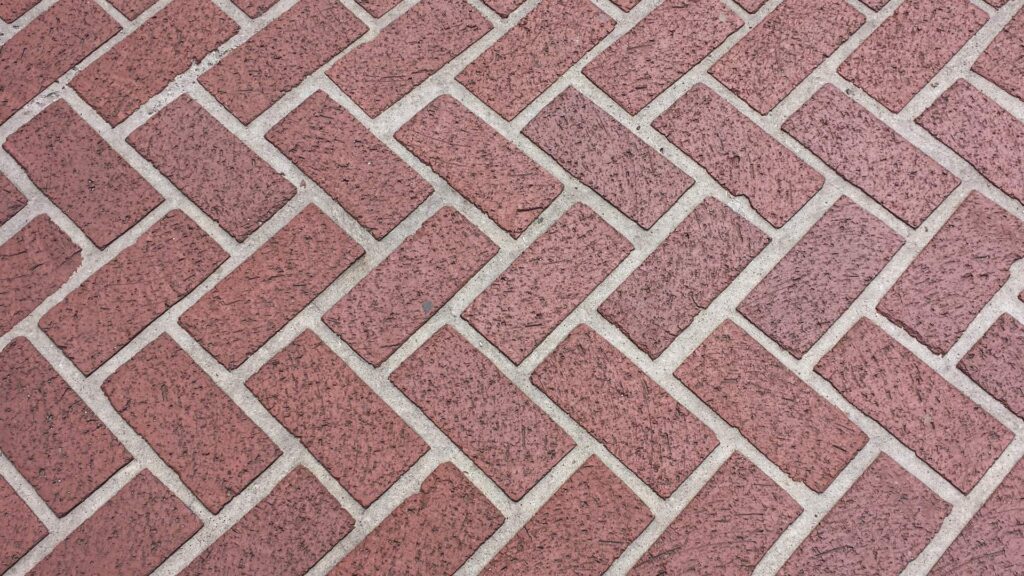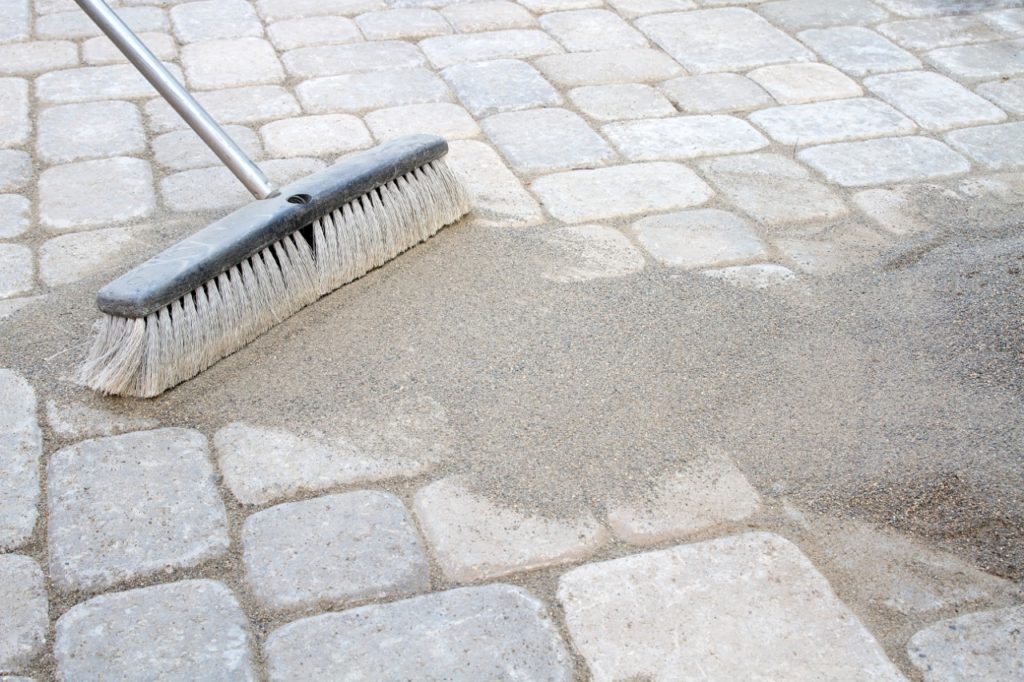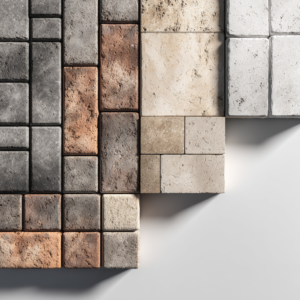Grout’s common uses in homes involve filling in tiles of shower floors and kitchens. The mixture is also popularly used for masonry walls, joining pre-cast concrete sections, sealing joints, and filling voids. This raises the question: Can you grout pavers too?
After all, with so many possible applications, you’re probably wondering if you can also use the substance in outdoor flooring. In this article, we will not only answer that question but also go over some important details about the material.
Read also: How much does it cost to have pavers installed in 2024?
Jump to:
Can you put grout between the pavers?
Yes, you can grout pavers. Although we don’t think that’s the best approach; a common sand installation is better, as we will explain later on.
Grouting an outdoor paver installation is no different from an indoor stone or tile project. However, although it is not uncommon to use the substance, polymeric sand still is the most popular and best option when it comes to paver joints.
Generally, grout is a blend of water, cement, and sand. And you can use it in many ways. The substance is often color-tinted when it has to be kept visible. Sometimes, it includes fine gravel when you use it to fill large spaces (such as the cores of concrete blocks).
Unlike other architectural glues (such as plaster or joint compound), when you mix and apply the grout correctly, it forms a water-resistant seal. Although both grout and mortar are applied as a thick emulsion and harden over time, grout has low viscosity and a lack of lime.

How to use grout between pavers
There are two methods for grouting patio pavers — and neither is difficult to do:
- The first way requires you to use a grout bag.
- The second process requires a stiff-bristled brush and semi-dry grout.
Both ways are efficient, so your choice depends on the materials and tools at hand.
- Start by sealing your pavers first, as it prevents stains caused by grout, which can be hard to clean up after you complete the process.
- If you’re using a grout bag, just squeeze it from its end. The quicker you do, the faster the contents squirt from the ½-inch hole at the end.
- If you go for the semi-dry grout, first make sure you choose a day when there’s no rain expected. Mix the grout by adding a small amount of water; it allows you to sweep the substance into the paver joints quickly and easily.
We suggest you make sure pavers have no excess debris on the surface before you start; it will help keep the grouting clean and efficient.
How long does it take for grout between pavers to dry?
On average, grout takes between 24 and 72 hours to dry. Still, the precise drying time depends on different factors like; the type of grout and humidity levels.
We recommend you allow the grout to dry. Make sure the period corresponds to at least the time recommended by the product manual. But the longer you wait, the better.
How long does grout between pavers last?
Despite being an excellent material for indoors, lasting up to 15 to 20 years (with appropriate maintenance), the same does NOT happen with grouting in outdoor projects. If you grout pavers, you can expect it to last 3 to 5 years tops.
Remember: when you use this substance, you have a very delicate, highly porous, and absorbent product in hand. So, it’s vulnerable to water damage. Grout needs sealing for protection. When you use the proper sealant, your paver flooring will become more resilient.
The 3 main types of grouts to put in between pavers
There are basically three types of grout you can choose from for your project: cement-based, epoxy, and resin.
1. Cement-based grouts
Cement-based grout is a mixture of cement, sand, and water. It is widely used in various construction applications due to its strength and versatility.
It provides a robust and durable joint that can withstand significant loads and traffic and is suitable for a variety of paver materials, including concrete, natural stone, and brick.
However, when it comes to design choices, you don’t have many options outside the gray hue of cement, and the somewhat porous appearance of cement-based grout may not fit every design.
2. Epoxy grouts
Epoxy grout is composed of epoxy resins and a filler powder, offering superior performance in terms of durability, chemical resistance, and stain resistance.
It is highly resistant to cracking, staining, and chemical damage, and it is easy to clean and maintain, retaining its appearance for many years.
Epoxy grout works best for areas exposed to harsh conditions and heavy traffic, or where hygiene is a priority – such as commercial kitchens or outdoor dining areas. Due to its quality, it is the most expensive of all the options.
3. Resin-based grouts
Resin-based grout involves the use of a resin binder mixed with decorative aggregates, creating a visually appealing and highly durable surface.
It offers a wide range of decorative finishes and colors, and it is strong and resistant to weathering, making it suitable for outdoor applications.
It is mostly applied in decorative walkways, garden paths, and areas where aesthetic considerations are paramount.
Polymeric sand
Despite being a good material for indoor paving projects, there are better alternatives to grout when it comes to outdoor flooring. Both sand and polymeric sand (in case you’re looking for the best option), will outperform grout in every way.
Polymeric sand, specifically, has noteworthy binding power. When you wet this sand, it activates the polymers, which hardens the various components, effectively locking the pavers in place.
Although more expensive, the product has excellent properties. Once hardened, the alloy won’t wash away easily with heavy rain or water from a hose. This means you won’t have to worry about refilling or regrouting pavers every 3 to 5 years.
Read also: Sand for paver joints: which is the best?

Can you grout pavers yourself?
So – can you grout pavers yourself? Yes, you definitely can. The method is somewhat simple, and you don’t need expensive equipment for it; that said, asking someone to do it for you might be safer, especially because you need to seal your pavers first.
At JS Brick, we have 20+ years of experience providing paver installation, supply, and maintenance services in Sarasota and surrounding cities. For a free estimate on paver grouting, cleaning, and sealing services, don’t hesitate to leave us a message or a call right now!



